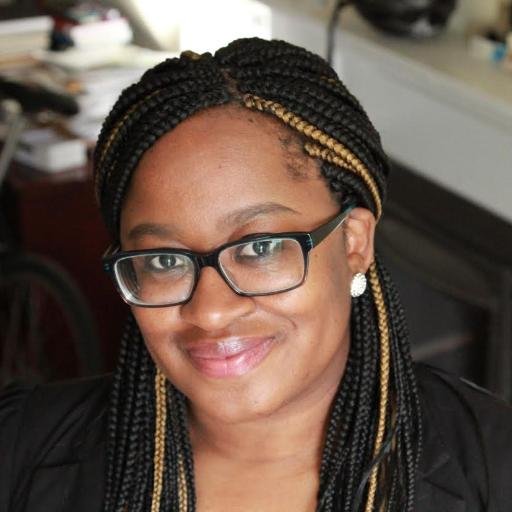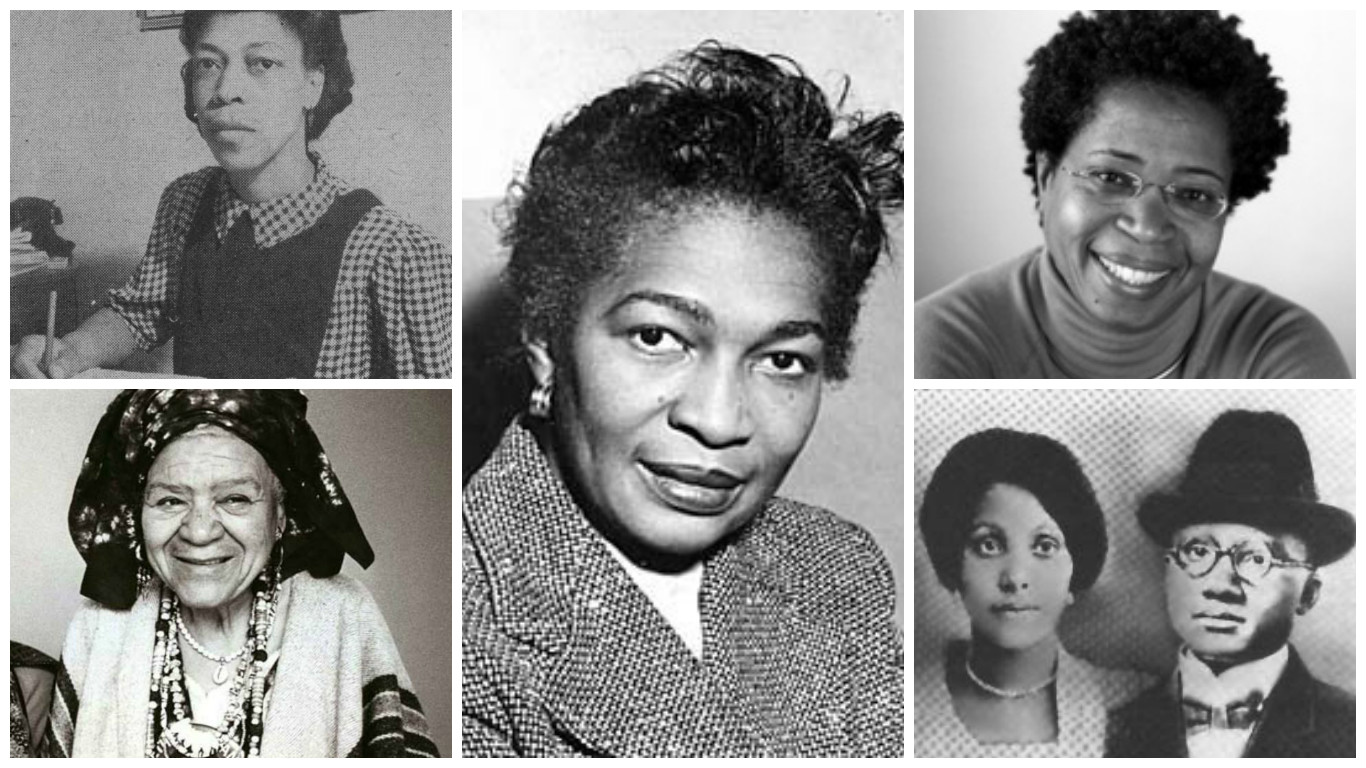Women, Gender Politics, and Pan-Africanism: An Interview with Keisha N. Blain

In today’s guest post, Kathryn Vaggalis, the managing editor of Women, Gender and Families interviews Keisha N. Blain about the special journal issue she recently edited with Asia Leeds and Ula Y. Taylor. This Fall 2016 issue on “Women, Gender Politics, and Pan-Africanism” examines the gendered contours of Pan-Africanism and centralizes black women as key figures in shaping, refining, and redefining Pan-Africanist thought and praxis during the twentieth century. The special issue includes an introduction from the guest-editors and features essays written by Erik S. McDuffie, Minkah Makalani, Ashley D. Farmer, Courtney Desiree Morris, Belinda Deneen Wallace, and Jeffrey Parker. The issue is now available in hardcopy and online through ProjectMuse and JSTOR. Readers can download the introduction here.
Blain, the senior blog editor of AAIHS, is a Visiting Research Scholar in the Department of Africana Studies at the University of Pennsylvania and an Assistant Professor of History at the University of Iowa. She completed a PhD in History at Princeton University. She specializes in 20th century United States History, African American History, the modern African Diaspora, and Women’s and Gender Studies. Her research interests include black internationalism, radical politics, and global feminisms. Her forthcoming book, Set the World on Fire: Black Nationalist Women and Global Struggles for Freedom (University of Pennsylvania Press, 2018), uncovers the crucial role women played in building black nationalist and internationalist protest movements in the United States and other parts of the African Diaspora during the twentieth century. She is one of the co-editors of Charleston Syllabus: Readings on Race, Racism and Racial Violence (University of Georgia Press, 2016).

Kathryn Vaggalis: Tell us about Pan-Africanism, for those for whom the concept is new. How did women and gender contribute to the making of this global politic?
Keisha N. Blain: In the broadest sense, Pan-Africanism refers to a movement and ideology centered on the belief that peoples of African descent throughout the continent and in the diaspora share a common past and destiny. This shared understanding of the past and future informs how people of African descent mobilize against racial discrimination, colonialism, and economic, political, social, and cultural oppression. Throughout history, Pan-Africanism has taken on various meanings and manifestations. This includes, but is certainly not limited to, Ethiopianism (race redemption ideas derived from a biblical conception of Ethiopia) and Garveyism (the political teachings of the charismatic Jamaican black nationalist Marcus Garvey). Perhaps the most well-known manifestation of Pan-Africanism is the series of Pan-African congresses of the twentieth century (1900-1945), led primarily–but not exclusively–by W.E.B. Du Bois.
Much of the scholarship on Pan-Africanism tends to emphasize the ideas and activities of men. This is not all that surprising and is reflective of larger trends in the broader literature on black internationalism. Despite their marginalization in the literature, however, black women played (and continue to play) central roles in shaping Pan-Africanist movements and discourses. They not only established and led an array of Pan-Africanist organizations but they used their writings and speeches to challenge the masculinist framing of Pan-Africanism, calling instead for the inclusion of women’s voices and concerns. This special issue foregrounds the ideas and activism of a cadre of black women whose stories have been largely marginalized in the scholarship. Significantly, the issue not only highlights women’s contributions to Pan-Africanism but grapples with how gender informs these movements. To that end, it demonstrates how ideas about Pan-Africanism and the dynamics of these movements were very much shaped by social relations between men and women and particular ideas about gendered divisions of labor. Oftentimes, these ideas were in flux and certainly in tension.
Vaggalis: What inspired you to create a collection of writings on women, gender politics, and Pan-Africanism? What contributions to the field will this special issue make?
Blain: In many ways, this special issue grew out of our collective frustration that despite the proliferation of feminist scholarship, there are still a limited number of books and articles on Pan-Africanism that foreground women’s ideas and activities and center the role of gender. I remember reading a new book on Pan-Africanism in 2013 and in three hundred pages, the author had managed to tell a history of Pan-Africanism without mentioning one woman or offering any kind of gender analysis. This frustrated me because it was not the only new book on some aspect of Pan-Africanism to follow this unfortunate pattern. I thought immediately about the students who would read these new books and possibly embrace their narratives as complete. For me, it was not just about including a few women’s names in a book but more significantly, it was about presenting an accurate history of Pan-Africanism that took seriously how these ideas and movements were shaped by a diverse group of historical actors. It was about telling a richly nuanced story that would not simply replicate masculinist narratives but completely shatter them. I felt compelled to do something about it and my conversations with Asia Leeds and Ula Taylor confirmed that I was not alone. Together, we decided to develop a special issue that would center women and gender in the history of Pan-Africanism, featuring some of the best and most innovative work in the field. What began as a series of conversations gradually developed into the publication of what I believe is a groundbreaking special issue that will have a lasting impact on the field.

The six essays featured in this special issue analyze Pan-Africanist women’s leadership and activities in a range of organizations and highlight the ideas and praxis of unsung black women activists and theorists who have been relegated to the footnotes of United States and African Diaspora history. For the sake of brevity, I’ll only highlight two. The first is a brilliant essay by historian Erik S. McDuffie that excavates the political life of Grenadian Pan-Africanist Louise Little—best known as the mother of black nationalist leader Malcolm X. Utilizing the theoretical framework of what he refers to as the “diasporic Midwest,” McDuffie shows how Little’s engagement in Pan-Africanist politics in Omaha, Nebraska and later in Lansing, Michigan helped to forge transnational linkages between black activists in the United States and other parts of the Diaspora. Readers will also find in this special issue a path-breaking essay by anthropologist Courtney Morris that examines the ideas and activities of Maymie Leona Turpeau de Mena, a leader in Marcus Garvey’s Universal Negro Improvement Association (UNIA). Drawing on new archival materials as well as rich ethnographic research, this essay offers a necessary corrective to historical narratives on De Mena, which have incorrectly identified the activist as an Afro-Nicaraguan immigrant. These two essays alone offer glimpses into the major historical and historiographical interventions of this special issue.
Vaggalis: How does this special issue fit with your own scholarly interests?
Blain: This special issue captures many of the core themes of my own research. My work centers on twentieth century black internationalism and not surprisingly, I am especially attentive to gender. I am always drawing insights from other fields of study–even though I am a historian by training. And as I write, I am always moving between the local, the regional, the national, and the transnational. I do all of these things in my forthcoming book and have also explored these issues in several journal articles. My article in the Journal of Social History examines how black nationalist women engaged Pan-Africanist discourses during the 1940s; and my article in Souls is centered on a black woman activist’s engagement in Afro-Asian political movements of the 1930s. I have a new article coming out in Palimpsest that explores black women’s internationalist politics. In this piece, I discuss women’s involvement in both Pan-Africanist and Afro-Asian movements during the 1930s and 1940s. Although this special issue centers specifically on Pan-Africanism, it certainly reflects my scholarly interests and I look forward to producing more work on this topic. It was exciting to edit this issue with two scholars whose work has been a model and source of inspiration for my own. It was also very rewarding to see that several authors had cited and engaged my work in their essays.
Vaggalis: Why did you choose WGFC as a venue for this scholarship?
 Blain: I am an avid reader of WGFC. I especially appreciate the journal’s multidisciplinary and transnational focus and have been impressed with the high quality of work produced in WGFC. The essays in WGFC all offer transnational, multi-ethnic, and diasporic approaches to Women’s and Gender Studies and African American Studies; and they collectively capture the range of research methods and methodologies in the Social Sciences and the Humanities. Over the years, I have used many of the essays for my own work and have assigned several pieces in my classes. When Asia Leeds, Ula Taylor, and I spoke about where we might pitch this special issue, we agreed that WGFC would be the ideal venue and proceeded to submit a proposal. Thankfully, the editors and board members embraced our vision. It has been a pleasure working with everyone at WGFC and I would encourage scholars doing this kind of work to submit pieces for consideration.
Blain: I am an avid reader of WGFC. I especially appreciate the journal’s multidisciplinary and transnational focus and have been impressed with the high quality of work produced in WGFC. The essays in WGFC all offer transnational, multi-ethnic, and diasporic approaches to Women’s and Gender Studies and African American Studies; and they collectively capture the range of research methods and methodologies in the Social Sciences and the Humanities. Over the years, I have used many of the essays for my own work and have assigned several pieces in my classes. When Asia Leeds, Ula Taylor, and I spoke about where we might pitch this special issue, we agreed that WGFC would be the ideal venue and proceeded to submit a proposal. Thankfully, the editors and board members embraced our vision. It has been a pleasure working with everyone at WGFC and I would encourage scholars doing this kind of work to submit pieces for consideration.
Kathryn Vaggalis is a doctoral student in American Studies at the University of Kansas specializing in late nineteenth and early twentieth century race, gender, and immigration. Her current work focuses on the influence of turn-of-the-century eugenics and sexology on constructions of U.S. citizenship and belonging, particularly in the cases of Asian and Southern European immigrant families and marriage practices. She is the managing editor of Women, Gender, and Families of Color, a biannual, peer-reviewed journal published by the University of Illinois Press and hosted by the University of Kansas.
Copyright © AAIHS. May not be reprinted without permission.
Digging into this issue right now! Thank you Dr. Blain for organizing it.
Thank YOU for your kind support.